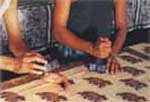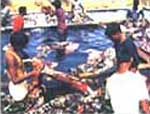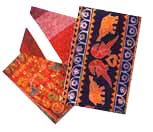|
|
|

|
|
Block
Printed textiles -
Rajasthan is an important producer of textiles in India.
Especially the printed and tie-and-dye varieties. Textile
printing is practiced in many areas of the State, with
each having its special color scheme,design,and technique.
The most important centers are Sanganari, Bagru, Jodhpur,
Akola(in Chittorgarh district) Nagaur, Jaisalmer and
Barmer.
|
|
In the last century, many printers
of the Chippa community,the traditional dyers and printers
of the chippa community, the traditional dyers and printers,came
from Alwar, Sikar, Jhunjhunu and other places to work
in these cities. Handblock printing is perhaps the most
popular kind of textile decoration as it allows the
printer to produce a wide range of fabrics in bright
colors and attractive designs to be made into saris,
odhnis, bedcovers and tablecloths.
|
|
|
Ajrakh
Prints
|
|
Ajrakh prints are based
on a special design in dark shades of blue and
red geometrical patterns. These prints are used
mostly for making turbans, coverlets and odhnis,
besides various other useful items. The design
of Jaisailmer and Barmer are similar to those
seen in the ajrakh textiles of Sind in Pakistan.
|
|
 |
Printing Blocks - The
printing blocks used by the Chhipas are procured from
the khatis (carpenters) of Jaipur or brought from Delhi,
Mathura, farrukabad and Pethapur, where traditional
woodcarvers create intricate
traditional designs from blocks
of gurjans or
|
|
teak wood as they have done for many generations.
|
|
Block Printing - The
process of printing is undertaken by the printer in
his small workshop sitting before a low, wooden table.
|
|
 |
Dyeing - Reams of dyed
cloth are hung on racks to dry. Black dyes are prepared
by fermenting iron oxide with molasses and gum; red
by extracting alizarin from madder roots and mixing
with the locally available dhawai flower in lukewarm
water in a large
|
|
copper pot; blue from indigo extracted from the leaves
of the neel plant (indigofera tinctoria); yellow from
pomegranate rind and raw turmeric. The millmade bleached
cloth is prepared for handblock printing by
washing and desizing for many hour.
|
|
Sanganer - With the
foundation of Jaipur, the handblock printing industry
in Sanganer flourished, enjoying phenomenal growth as
a commercial center. Its origin as a textile producing
center, however, remains shrouded
in mystery. In the
last
few decades, the
handblock printers who
had been working in sanganer for centuries received
a renewed
|
 |
|
impetus. Now, sadly enough, most of the printers have
resorted to screen painting instead of the time consuming
and costly block printing.
|
|
Drying Block Printed Textiles -
The printed pieces of cloth are dried in the sun and
after the dyes are fixed, the cloth is given one or
more washes and finally sized and dried before it is
ready for the market.
|
|
|
|